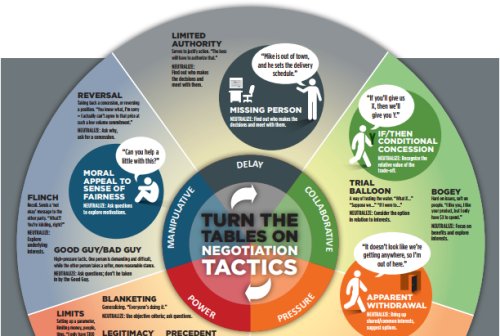"We are what we repeatedly do. Excellence, then, is not an act, but a habit." - Aristotle
Many negotiation gurus are so successful in their negotiations because of the key habits that they develop over a long period of time. I spent most of my week reading and researching into the key habits of great negotiators. Some of them have a few recurring key habits.
Your goal is to become a negotiation guru. Learn the habits from the great negotiators. Apply them into your life and see how the habits will work for you. Keep experimenting with them.
These are the 4 key habits that they have:
1. Prepare, Prepare, Prepare
You would not go ski-ing or sky diving without first preparing for it. Similarly, you should not enter a negotiation without having done enough preparation. Without spending adequate time on the preparation process, your negotiation success rate will drop dramatically.
Good negotiators spend a large amount of time preparing for their negotiation. They are not afraid to admit that they do not know everything . One way to prepare for their negotiation is to keep asking questions and finding out the interest of the other party.
2. Expect the best
"Expect the best. Prepare for the worst. Capitalize on what comes." - Zig Ziglar
All of us tend to make superficial and premature judgments about ourself and the other party. Wanting to protect ourselves, we focus exclusively on the failures. And all too often, our expectations come true . Since our expectations are coming true anyway, why not expect the best?
Engaging your negotiation with an expectation of the best will yield a much better result. This has been proven many time over by power negotiators. In other words, great negotiators' expectations had improved the performance of their negotiation. Where they had expected success, they found it .
3. Listen, Listen, Listen
"If A equals success, then the formula is A equals X plus Y and Z, with X being work, Y play, and Z keeping your mouth shut." - Albert Einstein
Listening is the only way to get information. It is found that all great negotiators are great listeners too. Active listening or reflective listening is a way to build mutual trust and understanding. It is an all-important skill as it enables us to receive the information accurately.
These are the advantages of listening:
1. Trust building
2. Builds mutual respect
3. Enhance relationship
4. Encourage the exchange of information
5. Safe environment for collaboration
From the advantages above, we can see why power negotiators have a habit of listening. They practice active listening . By listening, you will be able to have a better negotiation result.
4. Never compromise on integrity
Integrity is the single most important quality that you can develop to enhance every single part of our life, including negotiation. Integrity is the essential quality of a successful and healthy relationship. Having integrity meant that the other party is able to be completely honest with you.
Your integrity is evidenced in your willingness to hold on to your own values. It is easy for us to make promises. Keeping to promises is the hard part. When you act with integrity in everything you do, you will find that the other party will trust you more. You slowly build a reputation for yourself. You will find that as people trust you more, the more you win in a negotiation (provided you don't break the trust).
By never compromising on integrity, you will be doing more to ensure that your success in negotiation than any other things which you can ever do.
Jens Thang
Negotiation Skills for Everyone
Want to learn more about negotiation techniques and build your own arsenal of negotiation strategies? Avoid the pain of having to do terrible deals. Jens shares strategies, tactics, techniques, pictures, insights, podcasts, videos, interviews, ideas and stories about NEGOTIATIONS!
Jens is a member of International Association for Conflict Management (IACM).
Visit his site at http://www.thenegotiationguru.com
Related: Negotiations Training
Free Downloads

Neutralizing Negotiation Tactics
Public Negotiation Training